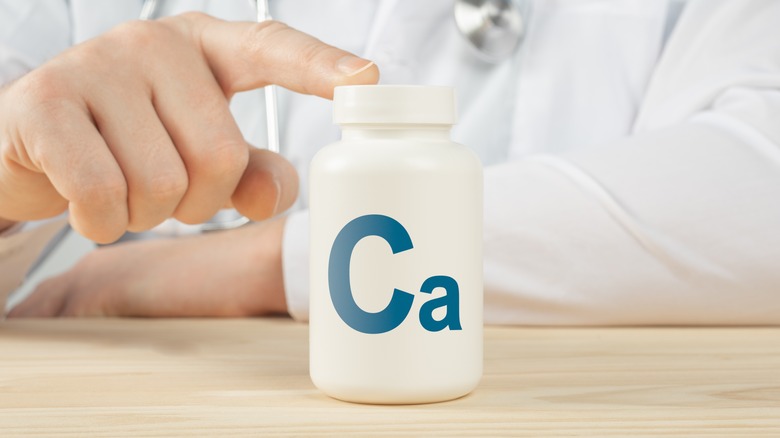Everything You Need To Know About Magnesium
What is magnesium? You already know it's a metal, an electrolyte, and an essential mineral in our diets. But what exactly does it do?
According to Healthline, it is involved in hundreds of metabolic processes, bodily functions, and enzymatic reactions in your body. So apparently, it does a lot. However, the same article claims almost 50% of people in the U.S. and Europe don't get enough of it from their diets. In fact, a 2017 study from the journal Open Heart calls magnesium deficiency a "public health crisis" and a major driver of heart disease (and other chronic diseases). The study goes on to explain that most of the body's magnesium is found in the muscles and bones. However, magnesium is also needed in the serum, and it can be pulled from the bones and muscles when serum levels are low. So, we could be magnesium deficient, but those blood tests that report our serum levels of magnesium could still come back normal. For this reason, the study asserts that most magnesium deficiencies are undiagnosed. Dr. Naoki Umeda explains in a Q&A with the Cleveland Clinic that symptoms of magnesium deficiency include fatigue, loss of appetite, nausea, and muscle spasms, all of which are common symptoms of many conditions.
With this in mind, it's a good idea to learn more about magnesium so that you can make sure you're getting enough of it.
Magnesium is the fourth most abundant mineral in your body
A study from the journal Nutrients identifies magnesium as the eighth most common element in the crust of the earth, as well as the fourth most abundant mineral in the body. It also claims magnesium is involved in over 300 enzymatic reactions and is a necessary component in the metabolism of adenosine triphosphate (ATP), the source of energy for all the cells. It's no wonder magnesium deficiency can cause fatigue — we need it to produce energy.
The study goes on to list a variety of bodily processes for which magnesium is crucial, including protein synthesis, muscle and nerve transmission, blood glucose control, and blood pressure regulation. It's also required for building DNA and RNA, for the production of both aerobic and anaerobic energy, and the structural development of bone and muscle. It is among the four most important electrolytes for the body, next to sodium, potassium, and calcium.
Both diabetes and hypertension (high blood pressure) are associated with magnesium deficiency, according to the study. This isn't surprising, since magnesium is involved in both blood glucose control and blood pressure regulation. There are a variety of other chronic diseases associated with magnesium deficiency, so it's important to consider whether or not you're getting enough from your diet or any other supplements you might be taking.
What are the recommended daily doses of magnesium?
Magnesium can be acquired from many common foods as well as supplements. A fact sheet from the Harvard School of Public Health notes that adult men need about 400-420 mg of magnesium every day, while adult women should get around 310-320 mg of magnesium daily. Meanwhile, pregnant women are told to aim for 350-360 mg of daily magnesium.
Pumpkin seeds and chia seeds are by far the most abundant sources of magnesium (per the National Institutes of Health), with just 1 ounce of each giving you 156 mg and 111 mg, respectively. Other seeds, nuts, legumes, whole grains, many vegetables, some fruits, and certain types of fish are also good sources. A healthy diet that includes a variety of foods will most likely provide sufficient dietary magnesium.
However, an unhealthy diet high in processed food and fast food may not include enough magnesium-rich foods and could potentially lead to magnesium deficiency. If you're not sure your diet has enough magnesium, talk to your healthcare provider about potentially taking a supplement. Working on improving your diet could also help improve your magnesium levels (not to mention your overall health).
Magnesium is necessary for the absorption of vitamin D
We often think of nutrients in isolation, zeroing in on one nutrient at a time. However, you may be aware that certain nutrients work together and are dependent on each other for optimal functioning. Harvard Medical School lists "dynamic duos," i.e. pairs of nutrients that work in tandem with each other. As the article explains, the five pairs it lists are just a sample — there are many more pairs and groups of nutrients that work together — but it helps to be familiar with some of these pairs when making food and supplement choices.
Magnesium and vitamin D are an example of such a pair. The Harvard Medical School article doesn't specifically list vitamin D and magnesium, but it does point out that vitamin D is necessary for the absorption of magnesium. Furthermore, Healthline states that magnesium regulates vitamin D levels and is also necessary for the absorption of vitamin D. Apparently, the nutrients are dependent on each other. The article recommends taking magnesium if you want to boost your vitamin D levels, but it's also probably a good idea to take vitamin D if you want to boost your magnesium levels.
Magnesium works together with calcium to support bone health
There are many examples of nutrient duos, and a single nutrient may be part of numerous duos. An article from MDLinx explains that magnesium and calcium work together to support bone health. We know magnesium is mostly contained in our bones (per a study from Open Heart), and we know calcium is also contained in our bones (this is common knowledge). The two are both crucial components of our bones, so it makes sense that they need to work together.
However, the MDLinx article goes on to warn that calcium and magnesium should not necessarily be taken together. While magnesium is needed for the absorption of calcium, taking large amounts of both minerals together can inhibit absorption of both. The article recommends taking them at least two hours apart. You will find some magnesium supplements that contain relatively small amounts of calcium (and vice versa) — the important thing is that the two minerals aren't present in the same amount.
WebMD also notes that large doses of minerals can compete to be absorbed and recommends taking calcium, magnesium, and zinc separately.
Magnesium and zinc play a role in depression
A study from Topics in Clinical Nutrition found both magnesium and zinc to be associated with depression. Specifically, it appears that deficiencies of both minerals are linked to depression. The study outlines some of the potential pathways through which a lack of sufficient levels of each mineral could lead to depression. These pathways don't seem to overlap — while both minerals play a role in the development of depression, they do so independently of each other.
The study points to research that shows magnesium deficiencies have been found in the cerebral spinal fluid and brains of those with suicidal thoughts, and magnesium supplementation has been shown to have antidepressant effects by way of serotonin production. For those struggling with depression, both magnesium and zinc may be worthwhile treatment options.
That said, though the two minerals do work together, a WebMD article cautions against taking magnesium and zinc at the same time. Some supplements with large amounts of one mineral will contain a small amount of the other, and this seems to work fine. But large doses of both taken together will compete with each other for absorption.
If you or someone you know is struggling with mental health, please contact the Crisis Text Line by texting HOME to 741741, call the National Alliance on Mental Illness helpline at 1-800-950-NAMI (6264), or visit the National Institute of Mental Health website.
Magnesium is crucial for muscle movements and nerve signals
Apart from being a building block of the bones, magnesium is also an essential component of our muscles and nerves (per Harvard Medical School). Both muscular contraction and nerve function are involved in neuromuscular transmission and work in tandem with each other: Neuromuscular transmission is what allows our brains to control the movements of our muscles through messages sent via our central nervous system (per ScienceDirect).
This suggests magnesium is involved in all the movements of our body. A study from Open Heart further explains that our muscles' stores of magnesium are a much more reliable indicator of magnesium levels (and potential magnesium deficiency) than serum magnesium levels. This is because magnesium can be pulled from the muscles (and bones and other organs) when serum magnesium is low.
Experts at ClinicalTrials recommend a "magnesium muscle stretch test" to determine potential magnesium deficiency in the muscles in a noninvasive way. They suggest this may be a more reliable test of magnesium levels than a blood test (which will only measure serum levels). In addition to the essential role magnesium plays in the muscles and nerves, it also helps to keep the heart pumping blood properly and boosts the immune system (per the article from Harvard Medical School).
Magnesium may help you relax and sleep
If there's one claim you've heard about magnesium prior to reading this article, it is most likely that magnesium can help you sleep. Magnesium has long been touted as a sleep aid, and it is also said to promote relaxation. An article from Healthline suggests it plays a critical role in relaxation and sleep.
This is in part because it regulates the sympathetic and parasympathetic nervous systems, according to a randomized controlled trial from MMW Fortschritte der Medizin. The sympathetic nervous system governs the body's "fight or flight" response, while the parasympathetic nervous system is in charge of the body's "rest and digest" response (via the book "Neuroanatomy, Parasympathetic Nervous System"). The randomized controlled trial from MMW Fortschritte der Medizin found magnesium supplementation could help improve stress, restlessness, irritability, and sleep disorders (just to name a few) by way of improving regulation of the sympathetic and parasympathetic nervous systems.
A systematic review and meta-analysis from BMC Complementary Medicine and Therapies found the improvement in insomnia in older adults taking magnesium supplements to be statistically insignificant, but the authors go on to note that evidence from randomized controlled trials may support the use of oral magnesium supplements as a sleep aid given how inexpensive and widely available such supplements are.
Topical magnesium oil may alleviate pain
Another popular use of magnesium involves oil (typically made from magnesium chloride) applied directly to the skin. You can buy the oil as a spray, or you can make your own: Healthline suggests taking boiled, distilled water and combining it with magnesium chloride flakes.
A study from the Journal of Integrative Medicine found that topical magnesium oil could improve symptoms of pain in patients with fibromyalgia (a condition that causes chronic pain). In addition, an article from MedIndia claims topical magnesium oil can help muscles relax and relieve tension. While magnesium oil may have some benefits when applied topically to the skin, it's important to understand that doing so is not necessarily a substitute for consuming magnesium. Healthline notes that it is unclear whether or not we absorb magnesium oil when it's on our skin the same way we absorb the mineral when we take it as a supplement. In short, most studies on magnesium supplements to date have focused on oral magnesium supplements, so we just don't know how much magnesium we can absorb from topical magnesium oil.
Dr. Naoki Umeda also explains in a Q&A with the Cleveland Clinic that magnesium sulfate (epsom salt) is known to be very relaxing when added to a warm bath. This is another way in which topical magnesium can relax the muscles. Epsom salt baths can help with relaxation, arthritis pain, bruises, sprains, swelling, fibromyalgia, and sore muscles (via WebMD).
What are the best sources of dietary magnesium?
As multiple sources note, magnesium is abundant in many healthy foods. Almonds, peanuts, cashews, pumpkin seeds, black beans, kidney beans, soybeans, cooked spinach, Swiss chard, potatoes with skin, brown rice, oats, salmon, bananas, raisins, dark chocolate, and yogurt are good sources of magnesium (via the Harvard School of Public Health).
A fact sheet from the NIH notes that pumpkin seeds and chia seeds have the most magnesium of any other sources, followed by almonds, spinach, and cashews. Other sources of magnesium include shredded wheat cereal, any breakfast cereal fortified with magnesium, halibut, whole wheat bread, and avocados. Additionally, chicken, beef, broccoli, white rice, apples, and carrots all contain modest amounts of magnesium.
Rather than memorizing this whole list, a good rule of thumb is to remember the categories of foods where it's found. Nuts and seeds, legumes, whole grains, and dark green leafy vegetables are all good sources. It is also found in fortified cereals, as well as some types of fish and meat. A healthy, varied diet will most likely provide sufficient magnesium, but try having a handful of pumpkin seeds every day if you're concerned about getting enough. Add them to a salad or your favorite dish, or just keep them on hand as a snack.
Magnesium supplements come in pills, powders, and liquids
Magnesium supplements are popular, partly because of the evidence to suggest they may have health benefits (via Healthline) and the fact that at least half of Americans may be magnesium deficient (via a study from Nutrients). Magnesium supplements come in pill form, but there are also magnesium powders and liquid tinctures, which are known to facilitate faster absorption. Pills need to be broken down by your stomach acid, which slows down absorption and can also reduce the amount that gets absorbed.
That said, it's important to be careful when taking any sort of supplement. Pills, powders, and tinctures can allow for the possibility of taking too much. While we can all agree that magnesium is essential and important for many of our basic functions, sources tend to be split on how safe magnesium supplements are for anyone to take. Some people tout their supposed health benefits, but others warn that most people shouldn't need them (via experts from Banner Health) and that they have the potential to be abused.
Registered dietitian Katherine Zeratsky explains in a Q&A (via the Mayo Clinic) that magnesium overdose from food isn't a concern, but high doses of magnesium supplements can cause diarrhea. For this reason, it's important to be careful when considering taking a magnesium supplement for the first time, and it should generally be done with guidance from a doctor or healthcare professional.
At least half of Americans don't get enough magnesium
Multiple sources claim at least half of Americans don't get enough magnesium, but some say the actual statistic may be much higher. A study from the journal of Osteopathic Medicine says at least half of Americans don't get enough magnesium, and a study from Nutrients explains that Western-type diets are low in magnesium (only providing about 30-50% of the recommended daily values) and that the dietary intake of magnesium has been declining over the past hundred years by roughly 60%. They cite U.S. National Health and Nutrition Examination Survey (NHANES) data suggesting about half of Americans are magnesium deficient.
These estimates are mostly based on nutritional survey data, but there are reasons to question whether they are accurate. Nutritional survey data is often unreliable, but even if the data is totally accurate, it might still overestimate how much magnesium we absorb from our diets.
A study from Open Heart discusses the role of mineral depletion from commercial soil used to grow crops and suggests that modern crops contain less magnesium than those of prior generations, which means we may all be overestimating how much magnesium is in all those magnesium-rich foods we eat. The study also suggests that many magnesium deficiencies are undiagnosed. Thus, magnesium deficiency affects at least half of Americans, but it may affect many more than we realize.
Modern crops have less magnesium than those of prior generations
You may have heard that modern crops don't have as many nutrients as those of prior generations. A study from the Crop Journal found modern celery seeds to have lower levels of magnesium than historical celery seeds, and they also found nearly two thirds of people in the U.S. and the U.K. weren't getting sufficient magnesium. They also discuss how magnesium has been depleted from the soil used to grow crops, specifically referencing long-term unbalanced crop fertilization as a mechanism for magnesium depletion.
Another study from Soil Science links the depletion of magnesium in soil to the increased use of calcium to treat soil. This and a variety of other chemical fertilizers have been used in modern agriculture to fertilize the same land to grow the same crops over and over again, season after season. We now know that soil gets depleted when constantly used to grow the same crops, even when it's treated with chemical fertilizers. We also know that chemical fertilizers have other unintended consequences.
The ancient practice of crop rotation involves rotating which plots of land are used to grow which crops season after season (via the Encyclopedia Britannica). A FAQ sheet about organic farming from the Food and Agriculture Organization lists crop rotation alongside a variety of other non-conventional farming practices as beneficial for rebuilding depleted soil. This suggests crops grown according to these practices may not be as nutrient deficient as their conventional counterparts.
Magnesium deficiency is associated with chronic disease
Magnesium deficiency is known to be associated with a variety of chronic diseases. As it is such an important mineral involved in so many different processes in the body (via the NIH), it makes sense that not getting enough could cause health problems. As registered dietitian Katherine Zeratsky states in a Mayo Clinic Q&A, one's risk of high blood pressure, heart disease, type 2 diabetes, and osteoporosis can increase with "chronically low levels" of magnesium.
An article from Healthline also links sleep problems to magnesium deficiencies, while a study from Nutrients further claims magnesium deficiency is associated with asthma, Alzheimer's disease, attention deficit hyperactivity disorder (ADHD), and migraine headaches.
Additionally, there are other symptoms associated with magnesium deficiency that aren't health disorders. According to Health Direct Australia, magnesium deficiency can cause loss of appetite, nausea and vomiting, fatigue, shaking, muscle spasms, hyperexcitability, and abnormal heart rhythms, among other symptoms. However, Dr. Naoki Umeda also notes in a Q&A with the Cleveland Clinic that there may be no noticeable symptoms of magnesium deficiency in the early stages.
Too much magnesium from supplements can cause diarrhea
With all the concern about modern people not getting enough magnesium (via a study from Nutrients) and about the depletion of magnesium from the soil used to grow crops (via a study from Soil Science), it can be tempting to think we all need to go out and buy magnesium supplements. However, the reality is that we need to be careful with magnesium supplements, even if we are magnesium deficient and have been prescribed these supplements by a doctor.
WebMD lists some potential side effects of taking magnesium supplements, including diarrhea, cramps, and nausea. The article suggests these side effects may happen even at normal doses, but very high doses can cause an excess of these symptoms as well as fatigue, low blood pressure, and muscle weakness. High enough doses can even be deadly. There are specific groups of people who may be at a higher risk for magnesium deficiency, including anyone with kidney disease, Crohn's disease, or other conditions that affect digestion, and those who have parathyroid problems, take certain drugs for diabetes or cancer, take proton pump inhibitors, or abuse alcohol. Older adults may also be at a higher risk for magnesium deficiency.
Talk to your doctor or healthcare provider if you believe you may not be getting enough magnesium, so they can help you figure out the right treatment plan for you and your needs.















